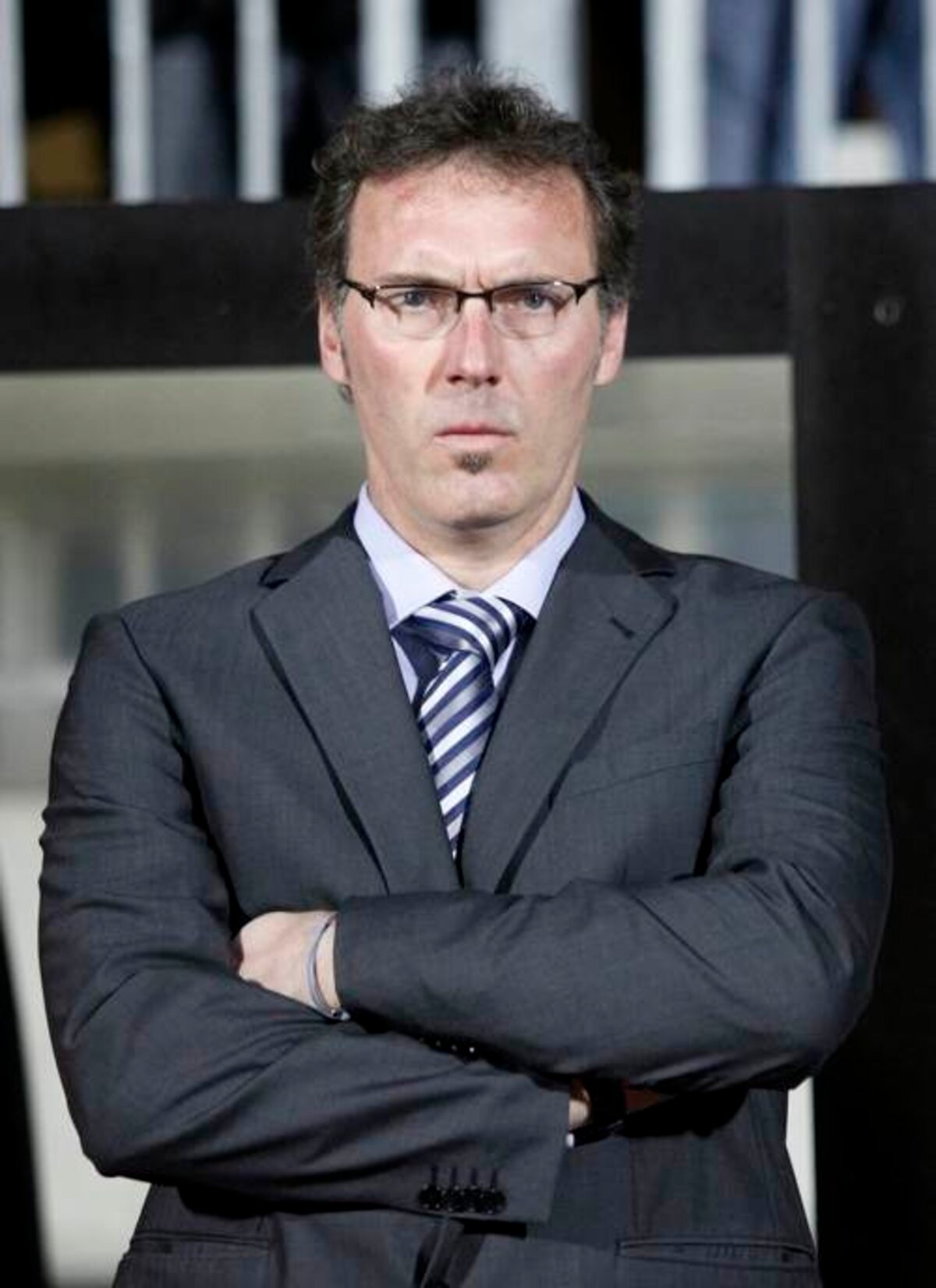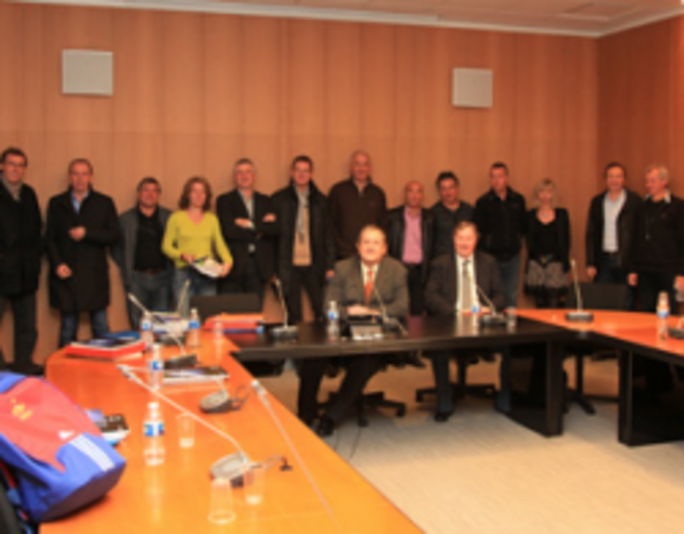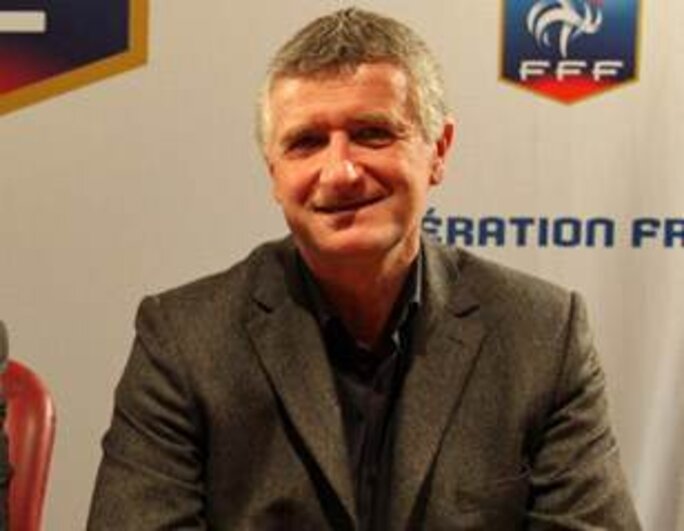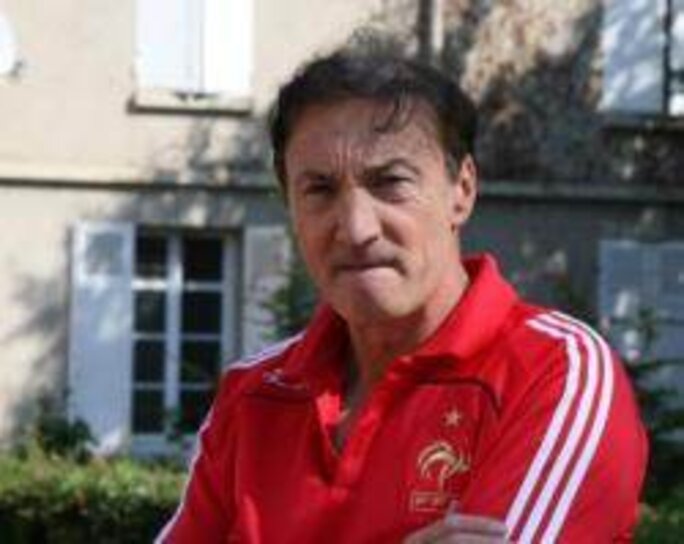The national technical director of the French Football Federation (FFF), François Blaquart, was suspended from his post on Saturday following Mediapart's revelations that he and members of the technical board had established a secret plan for an ethnic quota limiting the number of black and Arab youths at its training academies.
Blaquart was suspended pending the conclusions of an internal investigation by the FFF and another by the French sports ministry, led by its General Inspection department, the IGJS.

Enlargement : Illustration 1

Blaquart and France A-team coach Laurent Blanc were identified by Mediapart as among those actively promoting the ethnic filter plan, which both have denied.
"What I say here is the truth", Blanc told a hurriedly-prepared press conference in Bordeaux on Friday following Mediapart's revelations, "I have never heard discussions about quotas."
"For me, there is no project for quotas, that's false," he added. "And it's a lie to say that the [coach] took part in it."
On Saturday, Blanc apologised for "certain terms" of his language that Mediapart has revealed he used in the meeting when quotas were discussed (see transcription page 2).
Blaquart has denied Mediapart's report, saying: "I refute the Mediapart accusations. No instruction has been given to the training academies nor to the [under 21s, Under-20s] Espoir centres."
Mediapart maintains the veracity of the information published in our investigation. We publish here exclusive extracts from a crucial meeting where the quotas, and the general project of filtering-off of black and Arab youths from the selection process was discussed. The meeting of the FFF's National Technical Board, the DTN, was held in Paris on November 8th 2010.
Some 20 officials were present, including members of the DTN and national team coaches. During this meeting, the discussion was led by Blaquart who was then interim national technical director. He was appointed to the post after the resignation of his predecessor Gérard Houllier, following the disastrous performance and mutiny of the France team in the World Cup held last summer in South Africa. Houllier is now coach for English Premier League club AstonVilla, and Blaquart was confirmed as permanent national technical director in February this year.
FFF president Fernand Duchaussoy was not present during the discussions about racial quotas at the November meeting, appearing only at the end to wind down the conference. The meeting had the ambitious agenda of defining the major pillars of future French football policy. "What we are missing is a proper sporting policy by the federation," announced Blaquart at the opening of discussions.
Some forty minutes into the debate, the subject of French players with foreign origins was raised, peppered with the words "blacks", "beurs" (a popular term for French people of North African Arab origin), and "whites".
The basis of the debate centred around the conclusions of a commissioned audit of the performance of the FFF's National Football Institute, the INF (Institut National du Football), based at the Clairefontaine national training camp and centre west of Paris.
This prestigious centre has produced several top French football stars, including Thierry Henry, Nicolas Anelka, Louis Saha and William Gallas.
The audit was commissioned by the DTN in 2010 and underlined the fact that, over ten years, too many young players who held dual nationality, or who could obtain dual nationality, went on to play for foreign national teams after being trained at Clairefontaine.
'So it must be 30%?' - 'Not even that'
That November 8th, Blaquart set the agenda for the discussion with the words: "The INF is a wonderful adventure which has not had the

hoped-for evolution in terms of the approach of populations." The discussion then rapidly widened to include overall player recruitment policy and the recruitment of players as of the age of 12.
Mediapart can now lift the veil on the details of the discussions at that closed-door meeting. The following pages are selected extracts from a transcription of what was said, translated into English from the original French.
Verbatim extracts from the November 8th 2010 meeting of DTN members (words in italics between brackets are editor's notes added to help understanding of what was said):
Erick Mombaerts, France Espoirs (Under 21s) team coach: François, a debate by us on the subject is needed, even for just three minutes. You mentioned the figures from the last results of the [Editor's note: Clairefontaine] National Football Institute. Four A [France first team] French international players, 26 foreign international players, 20 or 26...
Laurent Blanc : That shocks me.
Erick Mombaerts: It shocks us.
Laurent Blanc: More than anything.
Erick Mombaerts: Do we get to grips with the problem and limit the number of kids who can change nationalities? Yes? No? So, in such a case, we have to do it under the elbow [discreetly]. That's to say, we have to do it...But do we have to do it? I think everyone must be involved here.
What do you think Laurent?
Laurent Blanc: I am completely favourable. Sincerely, it bothers me very much. What's currently happening in football, it bothers me very much.
In my opinion, we must try to eradicate it. And that has no racist connotation or anything else. When people wear the France national team shirt as of 16, 17,18, 19, 30 years old, U21s, and afterwards they go off to play in North African or African teams, that bothers me enormously.That needs, all the same, to be limited. I don't say we'll eradicate it, but limit it in those centres.
Erick Mombaerts: So it must be 30%? A third of the kids who can change [nationality]?
François Blaquart, France national technical director: Not even that.
Erick Mombaerts: Not even that ?
François Blaquart: Not even.
'We could trace, on a non-spoken basis, a sort of quota'
[In the extract below, the national technical director not only expressed his agreement to set up a quota, but said he had already given instructions on the subject to "Gérard". This refers to Gérard Prêcheur, the current director of the French National Football Institute, the INF (Institut National du Football), the principal training academy based at the FFF's Clairefontaine national football centre west of Paris.]

François Blaquart: We need to have a project. Me, I told Gérard that we were going to see each other for the qualifiers and that we limit. That we be much more pertinent in the approach, including here the evaluation of a state of mind and so on. I would say we have the means to do it. With 12 year-olds we realized that it was more difficult than with 15 year-olds. Above all, we give ourselves some guarantees. Ideally, in fact, it would be to say, but not officially; in any case we no longer take as many kids who are susceptible to ultimately changing [nationality].
Laurent Blanc: Or you [make them] pass through different selection criteria. You just have to look at the training centres. Even the Paris centre. You always see the same people because they always meet the same criteria for selection.
François Blaquart: We could trace, on a non-spoken basis, a sort of quota. But it must not be said. It stays as action only. There you are, we be careful. We have the lists, at some point in time.
Erick Mombaerts: We need to attack the problem, all the same.
Laurent Blanc: For me it's not coloured people who pose a problem. It's not coloured people, it's not North Africans. Me, I have no problem with them. But the problem, it's that those people must decide themselves and to try to let us help them to decide themselves. If there are only - and I'm speaking crudely - only blacks in the poles [youth training centres] and that those blacks regard themselves as French and want to play in the France team, that suits me fine.
Erick Mombaerts: But that, we can't know at 13 years old, when they enter our structures. We can't know. They are going to tell you that they feel French.
Laurent Blanc: You can help them to identify themselves.
François Blaquart: There has to be identification. Because, right, it's not the colour that makes...there are people who are, in every way and fundamentally, of French stock.
Laurent Blanc: But of course. As French as you and me.
François Blaquart: And then, the second thing, I go along with what Laurent said. On the state of mind, we indeed need to scratch at that a bit.
Erick Mombaerts: Yes, but that's not going to be simple. I think the best thing is to auto-limit ourselves. There are clubs like Lyon [French club Olympique Lyonnais] who do it in their training academies. They do it systematically. I went to [football club] Marseille. And Henri Stambouli [head of the Olympique de Marseille club's training centre] is putting into place at Marseille. Same thing, they're going to limit the number. There you are. The clubs, it's there, they're thinking it over. And they are going to to put in place too. They can't stand it anymore.
'Professional clubs can take them'
[In the extract that follows, there was a strong exchange of words between Laurent Blanc and Francis Smerecki, coach for the France Under-20s team, who denounced what he described as a policy of discrimination. Smerecki, as he himself underlines, is of Polish origin.]
Francis Smerecki: I hear all this, but if we remove all those people. If the bloke wants to be an international [player] it's all the same normal that he goes to a country where he can play. I think that's only human, after all. You were a player at a very high level, Laurent. If you had not been able to play for the France team...
Laurent Blanc: I would not have asked to play elsewhere. It's as simple as that.
Francis Smerecki: No but there are those [who would]. And we can recognize that it's only human to want to play.
Laurent Blanc: I recognise it. But it must not be all the players who can do that. Because all the blacks, if you take out the Antillais [from the French Caribbean], they are of African origin. So, African, they are going to be able to play in an African team.
Francis Smerecki: The Polish, when we arrived, we were white, and France had this Polish influence. And it served us, all the same.
Today, the rules have evolved. The blacks today, because it was Africa, and we are at fault all the same because we went to get them in wagon-loads. And today we want to separate ourselves from them?
Laurent Blanc: I didn't say separate ourselves from them.
Francis Smerecki: Well yes, in a way, because some have put forward the figure of 30%. That means we want to separate ourselves from them, in one way or another. We need to be concrete. The second point is that if all those people, black or beurs [North African Arabs], or others, we remove them, will we have a [football league] division left?

Erick Mombaerts: We don't want to remove them The professional clubs, they can take them. They spread them out. Here we're talking about [national team] federal structures.
We work for French football, we don't work for foreign selections.
Francis Smerecki: And at the same time as you work for French football, you work for the France team and also for the clubs. French football is not only the France team. But today, those people, if we remove them, I don't know if we have a division.
Laurent Blanc: You're turning the argument around.
Erick Mombaerts: But we don't want to remove them. They go into elite [French school] sports sections.
Francis Smerecki: I am not turning the argument around. I say, first thing, it is discriminatory. And if we remove the totality of those [dual nationals] who can choose for another [country's] squad, I don't know if we have a division. Because in all that, even if they go off to play for another country, there are League 2 clubs who live thanks to those players.
[This part of the conversation ended when one of the participants, who appeared uncomfortable with the subject, reminded those gathered that there are "300 French players" trained in France who play for foreign clubs. Laurent Blanc then returned with insistance on the subject of the selection criteria applied to youth players (next page).]
'You keep which ones? The whites? The less able?'
Laurent Blanc: Here we're talking about children aged 12, 13 or 14 years.
Francis Smerecki: You cannot say to people of the third generation, who are born on our soil...A kid who will go and play, I don't know, for Libya or Guinea, if he had the choice, if you took him [for the France team], he'd go with you, Laurent. He wouldn't go over there.
Erick Mombaerts: Please. Me, I'm going to take the problem the other way round. When we talk of structures, it's also the amount of place they take up. What interests me is that the youngster who is going to [eventually] play for the France team can be in the France youth team.
Francis Smerecki: Listen to me, what bothers me at the heart of the matter is that [there is] the one who is French-French and goes with Laurent, and the other, because he doesn't have enough aptitudes and skill to go with Laurent and who will go to [play for] another country, he's the one that you want to eliminate. It's impossible.
François Blaquart: It's not necessarily to eliminate him.
Francis Smerecki: Limit him? That means that you keep which ones? The whites? The less able?
Erick Mombaerts: Doesn't it shock you that the INF has produced four French international players and 26 foreign international players ? Can we not re-orientate things a little bit. Re-orientate.
Francis Smerecki: Hold on, you're not going to take Dédé [former Clairefontaine director André Mérelle] for a bigger idiot than he is. The good young white players, if ther was a young, talented white, he would have taken him, no?
[One of the participants at the meeting commented that he was "not sure that whites get their chance". About one hour later, France coach Laurent Blanc brings the conversation back to the same issues.]
Laurent Blanc: We don't want to eliminate foreigners, not at all, but to ensure that the centres for the Espoirs [18-21 year-olds who play in Under 20s and Under 21 national teams] or the DTN academies test with better defined criteria to be able to attract other people, because if we always have the same criteria, there will always be the same people.
And the more things continue, the more the situation will be. Because I'm on the fields every Saturday, I see some training schools. You have the impression that they really train the same prototype of players, big, strong, powerful. Big, strong, powerful. Big, strong, powerful. Big, strong, powerful. What is there that is currently big, strong, powerful? The blacks. And that's how it is. It is a current fact. God knows that in the training centres, in the football schools, well, there are many.
I think we need to refocus, above all for boys aged between 13 and 14, 12 and 13, to have other criteria, modified with our own culture.
I'm going to give you the example of the Spanish. They don't have these problems. They have playing criteria which are very precise, at 12 to 13 years of age.
Erick Mombaerts: That's the project.
Laurent Blanc: With our culture, our history etc. The Spanish, they told me ‘we don't have a problem. Us, we don't have any blacks'."
Erick Mombaerts: But Laurent, the phenomenon that you raise, it is so anchored in our country that the little-built whites that are in the Espoir training centres, the professional clubs leave them in my arms. They don't take them, in any case, even if they are good players.
Laurent Blanc: The clubs will always have their selection criteria. That you can't...even by training educators, you might in the long-run be able to change things a little bit, or influence a bit. But is is above all in the [national] centres that we need to have these criteria.
[One of the meeting's participants then spoke up to say that a good player is good whatever his skin colour or height.]
Laurent Blanc: Yes, but at the moment you don't have the choice because you always have the same stereotype of player. You exaggerate. I see training centres, I see them in Bordeaux, in the housing estates, and, I'm sorry, you always have the same stereotype of players. If you go to the Bordeaux, and you take the players, but little good players you won't find. So we need to incite.
Erick Mombaerts: Can we try to propose a project before the end of the year, something different, well not fundamentally different, but that serve as the force of a project. To say, there you are, we'll get on with that. Right, we've understood that we need to have an opening, to propose something and that we can tackle some well-established beliefs, notably the game, eh, the game, perhaps to the detriment of the individual. But the game, inevitably, will be to integrate other types of players. Because the game, it's intelligence, so it's other types of players. So everything is linked, everything is linked."
-------------------------
English version by Graham Tearse


